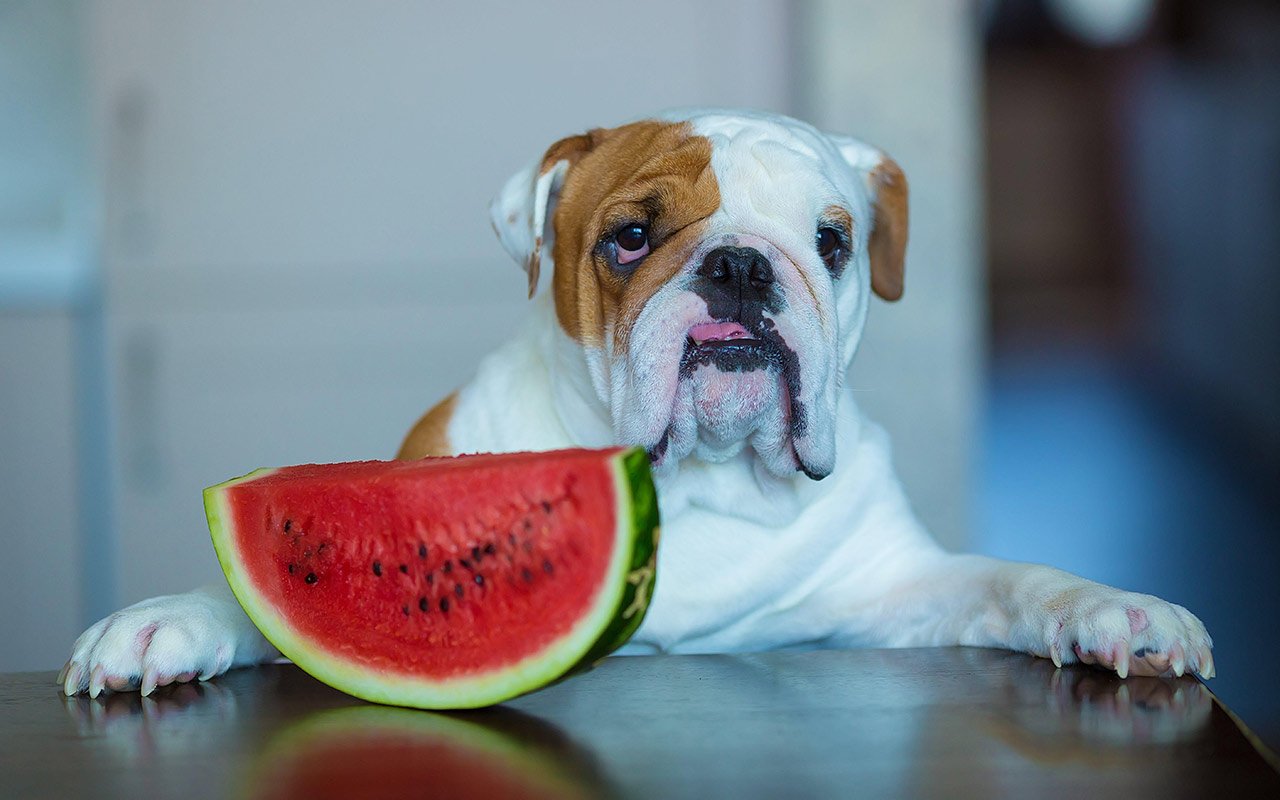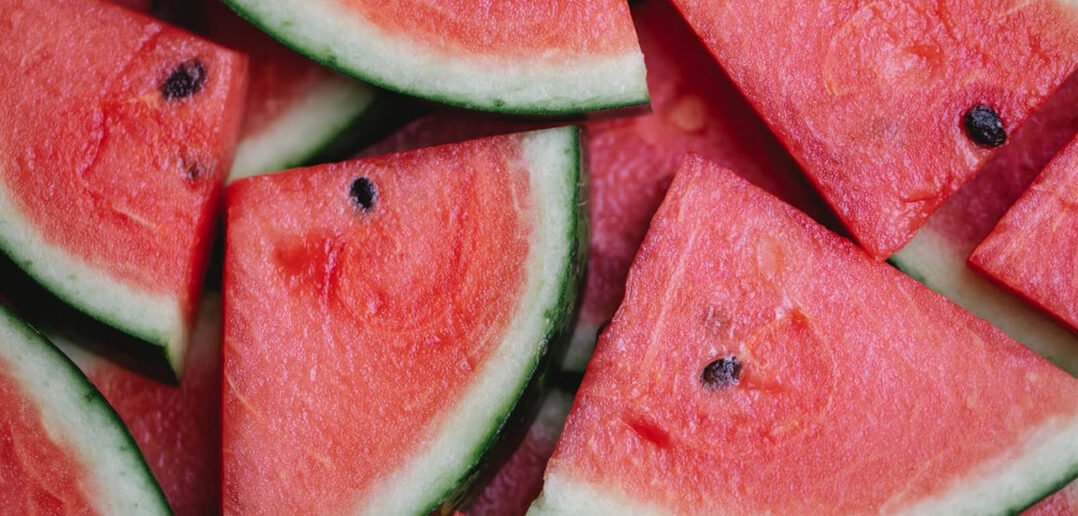A lot of people wonder that Can Dogs Eat Watermelon? While dogs can absolutely eat watermelon and that’s a good thing, read this article to avoid harming your dog when feeding them watermelon. Watermelon is a popular summer treat in the United States. It is often served at backyard barbecues and picnics.
Watermelon is sweet and juicy, with 92% water. This makes it the most water-rich fruit. It also has a high nutrient density that few fruits can match. It’s a popular choice for people but it’s also a good option for dogs. Everybody loves watermelon, even dogs. So, can dogs eat watermelon, and Is it safe to eat for dogs?
With a few precautions, the answer is yes. The first is that seeds can cause intestinal blockage. Make sure to remove them. It is also a good idea not to leave the rind on your fruit, as it can cause digestive upset.
Watermelon is a healthy food powerhouse. It’s low in calories, high in nutrients, and rich in vitamins A, B6, C, and potassium. This fruit is great for cooling down on hot days, as it has just 50 calories per cup and 92 percent of water. This fruit is also low in fat and cholesterol so it’s very healthy.
Watermelon is as rich in nutrients and water as it gets, so you need to be careful when giving your dog a treat. Let’s take a look at the advantages and dangers of giving watermelon to your dog as a treat.

Table of Contents
Benefits of Watermelon for Dogs
So what are the benefits of watermelon for dogs? Let’s find out together. Watermelon is high in antioxidants, potassium, and vitamins C, B6, A, and B6.
Watermelon is also rich in Lycopene, high fiber. The Watermelon Promotions Board (a USDA department) considers watermelon to be a superfood. Watermelon is 92% water. It’s a great choice for cooling down on hot days. The high nutritional content makes it a good snack option for you and your dog.
Let’s dive deeper into the health benefits associated with watermelon.
- Moisture: High moisture content (94%) is important for hydration.
- Antioxidants: Repairs damaged cells from environmental stresses placed on our bodies and those of our dogs. They are the antioxidation soldiers that seek out damaged cells and protect them from the decay that can lead to our dogs’ bodies becoming older.
- Lycopene: This is what gives watermelon and tomatoes their beautiful red color. It is also helpful in cancer prevention and support vision in dogs. Research also suggests that it slows down the rate of growth.
- Potassium: Supports healthy heart and kidney function, promotes bone density, regulates fluid levels, and aids muscle development.
- Vitamin C: Another powerful antioxidant that boosts immunity and reduces inflammation
- Fiber: helps to keep food moving through the digestive tract.
- Vitamin A: supports the proper function and quality of skin, hair, muscles, nerves, and coats.
- VitaminB6: A critical coenzyme that regulates fluid balance, builds proteins, regulates hormones, and supports neurotransmitters.
How to feed a dog watermelon
Watermelon, like all treats, should be given in moderation to your dog.
These are some guidelines for watermelon feeding to dogs:
- Only give your dog watermelon that is seedless or watermelon pieces that have been removed from all seeds.
- Use a melon baller to scoop out the fruit or cut it into small pieces. Be sure to remove the rind.
- Give watermelon to your dog only. Artificially flavored watermelon candy or treats might contain added sugars, artificial sweeteners, or other ingredients that could cause harm to your dog.
Here are safe ways to give watermelon to your dog:
In chunks: Remove the seeds and rinds from the watermelon
Frozen chunks: Remove the seeds and rinds from the fruit and freeze them in the freezer. Take the fruit out when you get home from work on a warm summer day. This will cool your dog down!
Puree: After seeds and rinds have been removed, puree the fruit and then freeze in an ice tray.
Watermelon ice cream: Blend frozen watermelon chunks and plain, unsweetened yogurt. You can add it to your dog’s food bowl, or make a Kong-shaped rubber toy. Plain yogurt is safe for most dogs unless they have lactose intolerance.
Plain yogurt is more tolerated than ice cream, and the beneficial bacteria in yogurt are great for intestinal health. Plain yogurt should not contain any artificial sweeteners or flavors.
To ensure that the product contains no toxic Xylitol, read the label. You might consider alternatives such as dairy-free, lactose-free yogurt, or yogurt made with plant products if your dog isn’t able to handle yogurt.
To avoid dangerous additives and ingredients, always read the label.
Preventive vet recommends that treats of any type should not exceed 10% of your dog’s daily calories. No matter how big your dog is, this rule will guide you in deciding how much watermelon to feed them.
Keep in mind that even though your dog may be staring at you with big puppy-dog eyes every day, they are happily eating the same food every day. Even though you might be tempted to indulge your dog on occasion, it is better for them to get their nutrition from their daily pet food.
Before you give your dog any human food, double-check with your vet to ensure that everything is OK. Watermelon is a good treat for dogs. However, you should make sure that your dog doesn’t have any adverse effects.
Watermelon Facts
A 15-to-20-pound watermelon will produce 90 six-ounce wedges or 11 cups of cubes.
Have you ever noticed that certain watermelon flesh has internal cracks? This is called Hollow Heart. It is caused by temperature fluctuations during the growing season. Hollow Heart melons can be eaten safely and are sweeter in certain areas because sugars tend to concentrate along cracks.
It takes three months for a watermelon to grow from seed to harvest.
50 years ago, seedless melons were created. They do not contain mature black seeds. However, you might see white seed coats where the seed has not matured.
Watermelon is known scientifically as Citrullus Lanatus.
It is a member of the Cucurbitaceae botanical family and is closely related to squash, pumpkins, cucumbers, and other squash.
Nutrition Facts
This delicious fruit is more than a snack. If you want to share it with your dog, then we are excited to tell you about the nutritional benefits of a cup of watermelon for dogs.
A cup of seedless watermelon provides your dog with vitamins, minerals, and antioxidants.
- 40 mcg Vitamin A
- 5 mg Vitamin B6
- 5 mcg Vitamin C
- 35 mg Iron
- Potassium 155 mg
- 10 mg Calcium
- Fiber: 5%
- 1 g Protein
- 5 g Carbohydrate, which converts to energy
- 5g Sugar (natural and insulated with fiber that slowly releases into the bloodstream).
The seedless watermelon contains 92% water and lots of vitamins. It is also a great source of fiber. Seedless watermelon for dogs has natural sugar. This is because the fiber content in the fruit allows it to slowly enter the bloodstream.
Dogs can also enjoy other fruits and vegetables, like apples and carrots.


